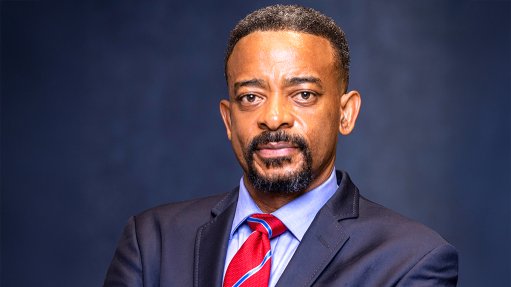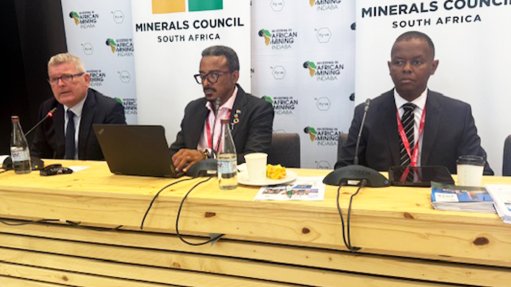Biodiversity can serve as nucleus for enabling sustainable development at peace with nature
A focus on biodiversity can serve as the nucleus to implement the United Nations Sustainable Development Goals (SDGs), as biodiversity looks at people, prosperity and a healthy planet through effective partnerships, says United Nations Development Programme (UNDP) South Africa resident representative Dr Ayodele Odusola.
Quoting the warning issued by UN Secretary-General António Guterres in December that "humanity is waging a war on nature", Odusola emphasised that Guterres considers making peace with nature the primary task of the twenty-first century.
"Biodiversity can serve as the nucleus for the engagement around the various interlinkages between SDGs. We think, given the UN environment-related conventions agreed globally, that there is a call to action for member States to adopt a common position to address the issue of biodiversity loss," says Odusola.
About $44-trillion of economic value generation, or about half of the world's gross domestic product, is moderately or highly dependent on nature and its services.
"Addressing biodiversity loss through actions that are nature-positive is an opportunity for the global economy, and it is estimated that it will create $10.1-trillion in business value a year, as well as create 395-million jobs by 2030, says JSE chief sustainability officer Shamila Soobramoney.
"Even if we only look at this from the perspective of South Africa, our biggest challenge is inequality and here is an opportunity to use nature-positive outcomes to address economic issues," she adds.
Soobramoney highlights that the World Economic Forum, which focuses on economic issues, not environmental issues, flagged climate change, environmental degradation, biodiversity and ecosystem risks as one of the top five threats to the global economy.
The actions of nongovernmental stakeholders, such as the private sector, are needed to achieve an equitable, nature-positive and carbon-neutral world. The role of business is critical in the risk and opportunities. Some business practices are exacerbating the risks, but in that there is an opportunity, she says.
"Once businesses can see how they can build a different future, it is easier for them to let go of ways of doing things and models that no longer serve to build the future. Making these conversations make more sense to business will help to develop practical ways of doing this," Soobramoney notes.
"We need to articulate the opportunities and businesses need to start to modify supply chain practices to reverse the decline of biodiversity and thereby avert a massive risk to business."
To this end, national biodiversity organisation the South African National Biodiversity Institute (Sanbi) carries out assessments and monitors biodiversity.
It is also responsible for the foundational biodiversity taxonomy, including mappings and classifications, which are the building-blocks required for the government and South Africa to take informed decisions, says Sanbi CEO Shonisani Munzhedzi.
Sanbi is also one of the accredited actors supporting projects on the ground, such as habitat rehabilitation and agroecology, with access to the Green Climate Fund and Adaptation Fund, and is working with local and international partners on many environmental and biodiversity projects, he says.
"One of the projects is the ecosystem-based disaster risk reduction programme, which is important as it also links biodiversity and climate change, and is making a difference on the ground to combat the effects of climate change."
Global conservation organisation the World Wide Fund for Nature South Africa CEO Dr Morné du Plessis highlights the role of partnerships in identifying, funding and implementing nature-positive actions.
South Africa, as confirmed by Odusola, has developed several interventions that are of relevance worldwide, including the large-scale clearing of alien invasive plant species from water catchment areas, growing indigenous plants in nurseries to be used for restoration of catchment areas and creating employment opportunities for local communities through the use of available climate and related funding to support sustainable, effective initiatives.
"These projects, such as helping small companies to process the cleared alien vegetation by producing mulch that is used in the agricultural sector and to produce sustainable charcoal products, are providing people with the opportunity to improve their livelihoods and create an income.
"Protecting and restoring biodiversity will not happen with government, business, nongovernmental organisations or funders working alone. Addressing and reversing biodiversity loss, which serves as the fabric of nature and as the systemic foundation for human life, health, jobs and economies and on which we depend for everyday needs of food, water and energy, requires all stakeholders to work together in a joint fashion," he says.
Article Enquiry
Email Article
Save Article
Feedback
To advertise email advertising@creamermedia.co.za or click here
Comments
Press Office
Announcements
What's On
Subscribe to improve your user experience...
Option 1 (equivalent of R125 a month):
Receive a weekly copy of Creamer Media's Engineering News & Mining Weekly magazine
(print copy for those in South Africa and e-magazine for those outside of South Africa)
Receive daily email newsletters
Access to full search results
Access archive of magazine back copies
Access to Projects in Progress
Access to ONE Research Report of your choice in PDF format
Option 2 (equivalent of R375 a month):
All benefits from Option 1
PLUS
Access to Creamer Media's Research Channel Africa for ALL Research Reports, in PDF format, on various industrial and mining sectors
including Electricity; Water; Energy Transition; Hydrogen; Roads, Rail and Ports; Coal; Gold; Platinum; Battery Metals; etc.
Already a subscriber?
Forgotten your password?
Receive weekly copy of Creamer Media's Engineering News & Mining Weekly magazine (print copy for those in South Africa and e-magazine for those outside of South Africa)
➕
Recieve daily email newsletters
➕
Access to full search results
➕
Access archive of magazine back copies
➕
Access to Projects in Progress
➕
Access to ONE Research Report of your choice in PDF format
RESEARCH CHANNEL AFRICA
R4500 (equivalent of R375 a month)
SUBSCRIBEAll benefits from Option 1
➕
Access to Creamer Media's Research Channel Africa for ALL Research Reports on various industrial and mining sectors, in PDF format, including on:
Electricity
➕
Water
➕
Energy Transition
➕
Hydrogen
➕
Roads, Rail and Ports
➕
Coal
➕
Gold
➕
Platinum
➕
Battery Metals
➕
etc.
Receive all benefits from Option 1 or Option 2 delivered to numerous people at your company
➕
Multiple User names and Passwords for simultaneous log-ins
➕
Intranet integration access to all in your organisation


















